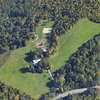‘Come out and enjoy it and support it’ says new manager of Bender Melon Farm Preserve
Erick McCandless is returning to the place where he started.
He grew up in Slingerlands, was trained in forestry, and now — after a sometimes far-flung career in environmentalism — he is the new project manager for the Bender Melon Farm Preserve.
McCandless says a bullet was dodged when a grassroots uprising prevented a mega-mall from being built on the rural land, which is now undergoing development on its perimeter.
In December, the Mohawk Hudson Land Conservancy paid $1 million for the 176-acre former Bender Melon Farm, near the corner of routes 85 and 85A in New Scotland.
To help pay for the purchase, the conservancy sold 20 of those acres along Route 85 for about half-a-million dollars to Ron Kay, who plans a hamlet-type development with retail and residential spaces.
At the start of the 20th Century, Charles Bender’s farm was famous for its melons, which were served in New York City’s finest restaurants. The farm was sold to William Taylor in 1939 as public tastes and farming itself changed.
McCandless, from his childhood, remembers the Bender property as a dairy farm, seeing cows wandering around in the fields.
He is interested in preserving its history and says in this week’s Enterprise podcast that there are still remnants of the famous Bender melons in the old barns on the property. Preserving the viewshed and the open space is also important to McCandless.
His original expertise was rooted in the land.
His first paid forestry work, after graduating from the Environmental Science and Forestry School in Syracuse, was as a member of an initial attack fire crew in Blue River, Oregon in the Willamette National Forest.
His crew would dig lines with hand tools and chainsaws, sleeping in the dirt, and eating questionable food. They’d duck and cover when the air tanker bombers cmae through, dropping fire retardent.
McCandless described the work as very exciting, very hard, and somewhat risky. He liked the organization and discipline that the military veterans in fire management brought to the tasks.
This past September he traveled to Oregon to revisit the site of his youthful labors and found Blue River no longer exists.
“A fire several years ago wiped it out,” he said.
Nevertheless, McCandless was able to locate what was left of the old ranger station — just some concrete and iron pipes coming out of the ground.
“Everything that I knew was more or less gone,” he said.
The Holiday Farm Fire in 2020, part of a pattern of increasing environmental disasters, was one of the largest in Oregon’s history, burning over 170,000 acres.
In his twenties, McCandless had chafed under Forest Service bureaucracy and returned to the East Coast for graduate work, earning two master’s degrees at Penn State.
One of his professors was from Australia and, through him, McCandless got a job with Australian pulp manufacturers, planning to continue the sort of computer modeling he had done at Penn State.
“They parked me in an office with a computer and no windows for about a week and I was like: Maybe I made a mistake,” McCandless recalled.
But then, due to budget cuts, he was sent into the field with a radio and a four-wheel drive jeep. His assignment: To study the wood density of a pine tree brought from California to Australia centuries ago.
“They grow like rockets down there,” McCandless said, and are used for both pulp and timber.
For some unknown reason, though, the density of the wood was going down, meaning more trees had to be cut to get the same amount of pulp. McCandless’s job was to find out what micronutrient was limiting the wood density. He found out a combination of copper and sulfur were a little short.
He loved driving the plantations in his jeep and seeing wallabies and koala bears, calling it the trip of a lifetime. Returning someday is definitely on his bucket list, said McCandless.
When he returned home, he landed a policy job with the New York State Legislature, which he considered “important work and a very good education” but not for him in the long run.
McCandless then got involved in environmental remediation and cleanups, and went on to help establish a natural resources group that secured funds for natural-resources damages. Damages applied not just to the environment but to communities in which there were hazardous waste sites.
McCandless then spent 16 years working for the Environmental Facilities Corporation, which he describes not as an agency but a corporation of New York State that “primarily does water and sewer infrastructure financing and assistance for municipalities.”
“But I wanted to come back around to my, let’s call it, my forestry background, my green environmental background,” said McCandless.
So, when he was offered the new part-time post of managing the Bender Melon Farm Preserve by the Mohawk Hudson Land Conservancy, McCandless said, “I jumped on it.” He added, “Maybe it’s a failure to retire.”
He’s been at the job just a few weeks but his excitement is palpable. “Right now,” McCandless said, “we’re looking at developing or improving some grassland bird habitat, maybe some pollinator sections.”
He spoke of David’s Trail as “a lovely walk through the woods.” That trail was dedicated last October in memory of David Iselin who died on March 3, 2018 of cardiac arrest just shy of his 28th birthday.
David’s Trail is adjacent to the town of New Scotland’s park — which features the rescued century-old Hilton Barn — that, in turn, is adjacent to the county’s Helderberg-Hudson Rail Trail.
McCandless is hoping to get some mountain bike trails on the north side.
He notes that the Mohawk Hudson Land Conservancy has just a half-dozen staff members but has several thousand acres of property and miles and miles of trails. During the pandemic, McCandless said, “Our preserves have gotten an incredible amount of use and attention and appreciation.”
The conservancy is dependent on the public both for volunteering and for contributing funds to conservancy projects.
McCandless said of the Bender Melon Farm Preserve, “I hope everybody will come out and enjoy it and support it in whatever way they can.”
“It’s such a big, beautiful property,” he said.


